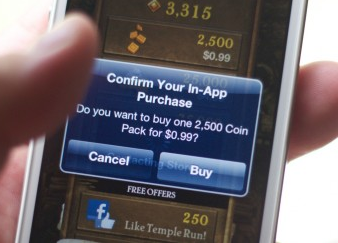 NEWS
NEWS
 NEWS
NEWS
 NEWS
NEWS
![]() Parents who were shocked to be billed for in-app purchases made by their kids have been given a welcome reprieve by Apple, which has agreed to refund those purchases.
Parents who were shocked to be billed for in-app purchases made by their kids have been given a welcome reprieve by Apple, which has agreed to refund those purchases.
According to reports, Apple has agreed to pay at least $32.5 million in refunds to parents who did not authorize their kids to make in-app purchases.
“This settlement is a victory for consumers harmed by Apple’s unfair billing and a signal to the business community,” said FTC Chairwoman Edith Ramirez. “You cannot charge consumers for charges they did not authorize.”
About three years ago, the Federal Trade Commission investigated Apple after it received complaints from parents who got the surprise of their lives when opening credit card bills containing in-app purchases made by their children. Naturally, some of these parents weren’t too happy with how Apple handled games such as Tap Pet Hotel and Smurf’s Village, which easily allowed players to purchase game coins for real money. Some items costs as much as $500, and so you can imagine how disgruntled some parents were when they received their sky-high credit card bills!
If you’re an Apple user, you’ll be aware that after purchasing an app there’s a 15-minute window that allows you to download more apps or even purchase in-app goodies – without being asked for your iTunes password. This magical 15 minute window is enough time for kids to run up massive bills on their parent’s credit cards.
The FTC and Apple have already agreed to halt this. The Cupertino giant came to an agreement where it pledged to make adjustments to its purchasing policies. Apple’s CEO Tim Cook stated that this was unfair to the company but nevertheless decided to comply.
“It doesn’t feel right for the FTC to sue over a case that had already been settled. To us, it smacked of double jeopardy. However, the consent decree the FTC proposed does not require us to do anything we weren’t already going to do, so we decided to accept it rather than take on a long and distracting legal fight,” Cook stated.
The settlement includes Apple refunding all unauthorized payments, which reports say would come to at least $32.5 million – if not more. If Apple’s repayment doesn’t reach that amount, the FTC will collect the difference.
Though the focus is on Apple, Carl Howe, a research analyst at the Yankee Group, stated that the company is just a small part of a much bigger equation involving app purchases. Howe pointed out that the FTC should also be looking into Google’s Play Store, where app purchases are easier since a password isn’t always required for app downloads or in-app purchases.
Though Apple’s app system may be flawed, parents should not forget that it is still their job to monitor their kids when handling electronic devices, especially ones that have the potential to put a dent in their bank accounts. Electronic devices may provide a way to teach kids educational stuff, but it’s not always advisable to hand over your iPad just to keep them quiet. If parents take the time to explain to their kids that purchasing things in games is similar to spending real cash, it’s likely that a lot less kids would actually do so.
Support our mission to keep content open and free by engaging with theCUBE community. Join theCUBE’s Alumni Trust Network, where technology leaders connect, share intelligence and create opportunities.
Founded by tech visionaries John Furrier and Dave Vellante, SiliconANGLE Media has built a dynamic ecosystem of industry-leading digital media brands that reach 15+ million elite tech professionals. Our new proprietary theCUBE AI Video Cloud is breaking ground in audience interaction, leveraging theCUBEai.com neural network to help technology companies make data-driven decisions and stay at the forefront of industry conversations.